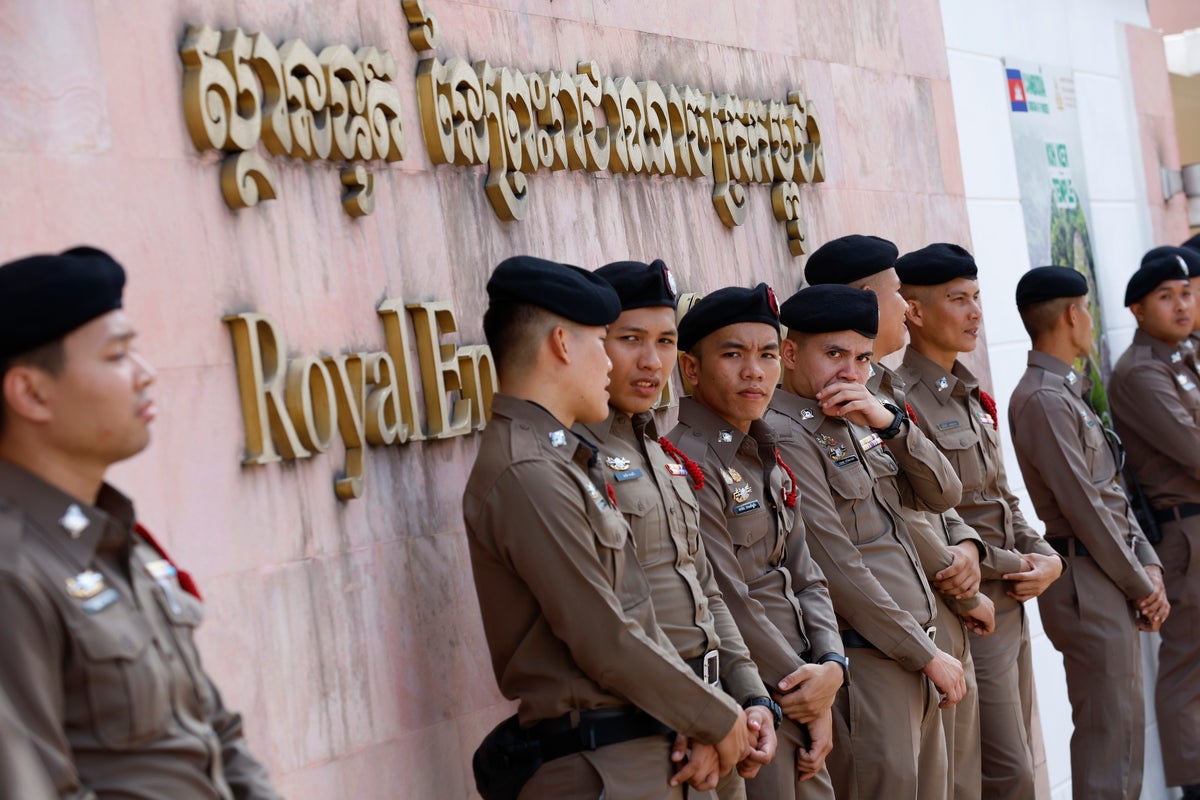
Tensions have escalated between Thailand and Cambodia following the death of a Cambodian soldier in May during a brief exchange of gunfire in a disputed border area.
The two Southeast Asian neighbours have contested sovereignty over various undemarcated points along their 817km land border for over a century. The border was initially mapped by France in 1907, when Cambodia was under French colonial rule.
Thailand later contested the map, which was based on an agreement that the border would be demarcated along the natural watershed line between the two countries.
In 2000, Thailand and Cambodia established a Joint Border Commission to peacefully address overlapping claims. However, little progress has been made in settling the disputes.
-and-Cambodian-General-Mao-Sophan-(.jpeg?trim=20%2C0%2C20%2C0)
Claims over ownership of historical sites have raised nationalist tension between the two countries, notably in 2003 when rioters torched the Thai embassy and Thai businesses in Phnom Penh over an alleged remark by a Thai celebrity questioning jurisdiction over Cambodia's World Heritage-listed Angkor Wat temple.
What have been previous key events?
An 11th century Hindu temple called Preah Vihear, or Khao Phra Viharn in Thailand, has been at the heart of the dispute for decades, with both Bangkok and Phnom Penh claiming historical ownership. The International Court of Justice awarded the temple to Cambodia in 1962, but Thailand has continued to lay claim to the surrounding land.
Tension escalated in 2008 after Cambodia attempted to list the Preah Vihear temple as a UNESCO World Heritage site, leading to skirmishes over several years and at least a dozen deaths, including during a weeklong exchange of artillery in 2011.
Two years later, Cambodia sought interpretation of the 1962 verdict and the ICJ again ruled in its favour, saying the land around the temple was also part of Cambodia and ordering Thai troops to withdraw.
What has caused the recent tension?
Despite the historic rivalry, the current governments of Thailand and Cambodia enjoy warm ties, partly due to the close relationship between their influential former leaders, Thailand's Thaksin Shinawatra and Cambodia's Hun Sen, whose daughter and son respectively are now the respective prime ministers in their countries. Thaksin and Hun Sen also remain active in politics.
But nationalist sentiment has risen in Thailand after conservatives last year questioned the government's plan to negotiate with Cambodia to jointly explore energy resources in undemarcated maritime areas, warning such a move could risk Thailand losing the island of Koh Kood in the Gulf of Thailand.

Tensions also rose in February when a group of Cambodians escorted by troops sang their national anthem at another ancient Hindu temple that both countries claim, Ta Moan Thom, before being stopped by Thai soldiers.
The issue is a problem for Thai Prime Minister Paetongtarn Shinawatra, whose government is facing multiple challenges on the domestic front, including a stuttering economy facing steep U.S. tariffs.
Thailand's military, however, has ramped up the rhetoric with statements that have contrasted with the government's conciliatory tone, expressing readiness for a "high-level operation" if sovereignty comes under threat.
Paetongtarn later echoed the military's position but said a peaceful resolution of the disputes was Thailand's priority. The mixed messaging underlines the troubled history between the billionaire Shinawatra family and the royalist military, which toppled its governments in 2006 and 2014.
Is either side working to resolve the issue?
After the May 28 clash, both countries quickly promised to ease tension, prevent more conflict and seek dialogue via their joint border commission at a meeting planned for June 14.
The neighbours have issued diplomatically worded statements committing to peace while vowing to protect sovereignty, but their militaries have been mobilising near the border, raising concerns about another flare-up.
Cambodia, meanwhile, said existing mechanisms were not working and it planned to refer disputes in four border areas to the ICJ to settle "unresolved and sensitive" issues that it said could escalate tensions.
Thailand has not recognised the ICJ's rulings on the row and wants to settle it bilaterally
Global LGBTQ+ advocates gather 'on Trump's doorstep' at World Pride despite travel anxiety
First cases of Covid variant NB.1.8.1 detected in England as virus spreads across UK
British woman held in Sri Lanka on drug offences could be months from bail
Watch: Hungry elephant storms shop to help himself to food
Liberal Lee Jae Myung wins South Korea election and promises unity after turmoil
Macron and wife Brigitte smile and hold hands as they board plane after shove video







